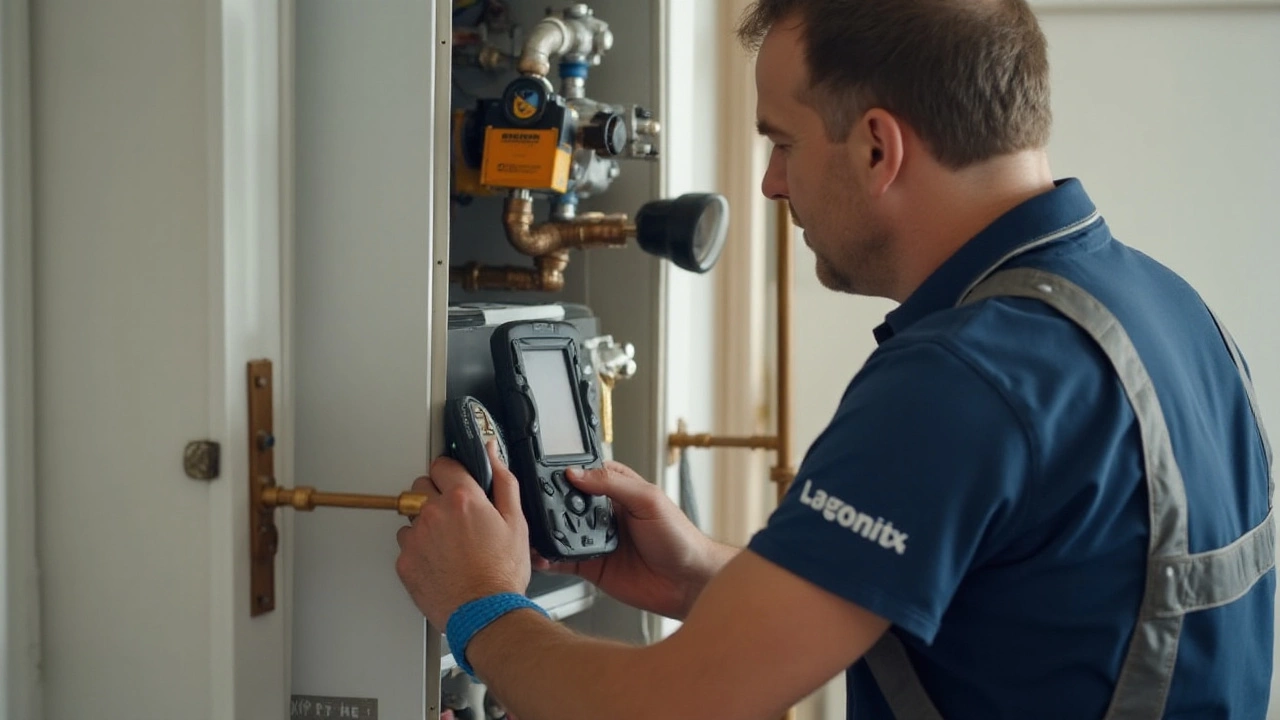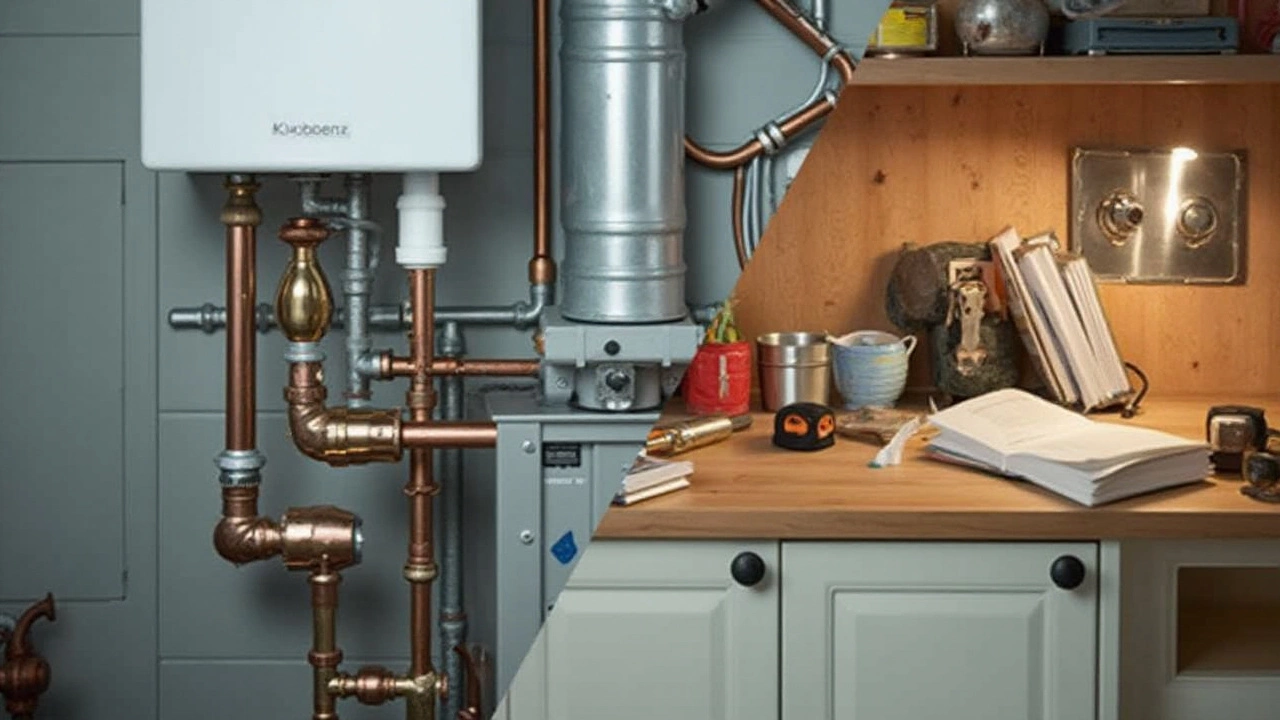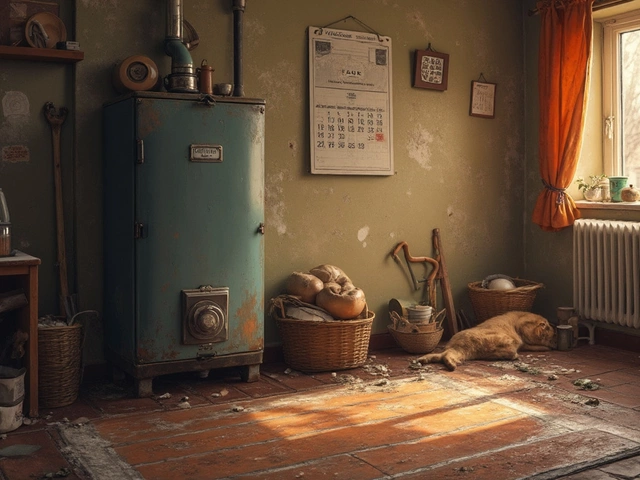Servicing a boiler is one of those household tasks that sits in the realm of uncertainty for many homeowners. With a mix of intricate components and the constant temptation to save on professional fees, it can be tempting to tackle the job yourself. But let's not forget—boilers are complex systems requiring a certain level of expertise.
Before you decide to roll up your sleeves and grab your wrench, there are several factors you ought to consider. Not all aspects of boiler maintenance are suitable for the average DIY enthusiast. There are risks and responsibilities attached, particularly when the line between a simple tweak and a hazardous mistake blurs.
In this article, we'll walk you through the essentials of understanding your boiler and outline what steps a regular homeowner could safely take care of. Additionally, we'll delve into when it becomes absolutely necessary to bring in the professionals to keep your boiler running safely and efficiently.
- Understanding Boilers
- Potential Risks of DIY Servicing
- Steps for Basic Maintenance
- When to Call a Professional
- Safety Tips and Best Practices
Understanding Boilers
The humble boiler, nestled away in a corner of our homes, works tirelessly to keep us warm and our water hot. To understand the importance of boiler maintenance, one first needs to grasp the fundamental mechanics of these crucial appliances. At its core, a boiler is a system designed to heat water or produce steam, which is then circulated through pipes to provide heat. The conversion of energy from fuel, whether it's natural gas, oil, or electricity, occurs within the boiler's closed environment, making it distinct from traditional heating systems.
A variety of boilers exist in the market today, each serving specific needs. Combi boilers, for instance, are popular in homes where space is a premium. They provide both central heating and hot water directly from the boiler itself. Conversely, system boilers store hot water in a separate cylinder, which can be beneficial for homes with high hot water demands. Traditional boilers, often referred to as regular boilers, require both a cylinder and a separate tank, making them suitable for larger homes.
Regardless of type, boilers share common components that aid their functionality. The heat exchanger is a pivotal feature, facilitating the transfer of heat from the burning fuel to the water. Modern boilers often incorporate sophisticated electronics to regulate temperature and ensure optimal efficiency. The importance of tweaking these settings should not be undermined. As reported by the Energy Saving Trust, properly maintained boilers can significantly improve energy efficiency, reducing fuel bills by as much as 30%. These potential savings underscore the value of understanding and maintaining your boiler.
The Lifespan of Boilers
Boilers aren't meant to last forever, with typical lifespans ranging from 10 to 15 years. However, service quality can greatly influence boiler longevity. A well-maintained boiler operates more efficiently and, crucially, poses fewer safety risks. Common issues such as leaks or component failures might appear insignificant to the untrained eye but can escalate into serious problems. Performing regular check-ups is akin to giving your car its MOT; both ensure durability and reliability.
"The better care you take of your boiler, the better it performs and the longer it lasts," advises the Chartered Institute of Plumbing and Heating Engineering. "Skipping servicing might seem like saving money initially, but the hidden costs of inefficient running can stack up over time."
Innovations in technology have led to the rise of smart boilers, equipped with diagnostics features that report faults before they turn into breakdowns. Investing in such technology can pay off in minimized downtimes and reduced repair costs, allowing homeowners to manage their heating systems proactively. Understandably, while the initial outlay might be higher, the benefits reflected in energy savings and comfort make it worthwhile.
Concluding our exploration of boilers, it's evident that knowledge equips homeowners with the power to manage their heating systems effectively. From recognizing your boiler type to understanding its operational cycles, each element contributes to making informed decisions on whether certain tasks are suitable for DIY or if a professional's precision is warranted. The next section will delve into these potential risks of DIY servicing, ensuring you are well-prepared to approach your boiler responsibly.
Potential Risks of DIY Servicing
When it comes to servicing your boiler, diving into the world of DIY might initially seem like an adventure full of learning and saving. However, it's important to recognize the potential pitfalls that accompany such a venture. Boilers are complex systems with a mix of plumbing, electrical components, and sometimes even gas lines, which means there is a lot at stake. One of the primary risks involves misidentifying or misdiagnosing an issue. A mistake here can lead to further complications or exacerbate the problem you are dealing with. Instead of prolonging the life of your boiler, you might inadvertently shorten it. Plus, there's always the chance of voiding any existing warranties if you tamper with components that are best left to the certified professionals.
Safety is undoubtedly a major concern with DIY boiler repair. Even a seemingly minor oversight or error can have serious consequences, such as leaks, malfunctions, or in a worst-case scenario, explosions. Boilers operate under pressure, and mishandling them can cause pressure build-ups that lead to catastrophic failures. It's crucial to have a thorough understanding of how these systems function before making any attempt at servicing. In particular, gas boilers, which are common in many households, pose additional hazards. Carbon monoxide leaks, which can be fatal, are a very real possibility if not handled correctly. According to The UK Health and Safety Executive, carbon monoxide is involved in approximately 40 deaths annually, underscoring the importance of professional handling.
Beyond safety, there are regulatory concerns to think about. Certain boiler servicing tasks, especially those involving gas, must legally be carried out by a Gas Safe registered engineer in the UK. Attempting DIY activities in these areas could result in severe legal repercussions, not to mention the insurance issues that could arise should a mishap occur. Insurance companies might refuse claims if they discover that unauthorized work was performed on your boiler system. For many, tackling a boiler servicing task is seen as a way to economize; the prospective savings, however, pale in comparison with the potential costs of fixing a bungled DIY job.
Expert Insight
One expert opinion comes from a representative of the Chartered Institute of Plumbing and Heating Engineering, who advises homeowners to prioritize professional assistance."The intricate nature of boiler systems isn't best navigated by those untrained—an expert's eye can save you more than just headache, it can save lives," they affirm.This advice highlights the value of experience and expertise, emphasizing that boilers should not be seen as typical DIY territory. Listening to the warnings and experiences shared by professionals can help you evaluate whether servicing your own boiler is truly worth the risk.

Steps for Basic Maintenance
Maintaining a boiler may seem daunting at first glance, but when you break it down into smaller tasks, it's entirely manageable for a discerning homeowner. To begin, safety is your priority. Before you even start, switch off the power supply and let your boiler cool down. While your boiler is complex machinery, there are basic upkeep tasks you can manage without risking safety. Starting with the simple act of checking for any obvious leaks or rust is crucial. Small issues can become major problems if left unchecked. Look for unusual noises or signals from your boiler system—your first clue that something might need attention.
Next, inspect your boiler's pressure gauge. Normally, a functional boiler should maintain a balanced pressure, generally between 1 and 1.5 bar. If the pressure is too low or high, it can affect performance and efficiency. You may find re-pressuring your boiler an easy task. You can usually adjust this using the filling loop, a small but essential task in boiler maintenance. Remember, going slowly is the key to avoid overpressurizing. A regular activity every few months is bleeding your radiators, which ensures a consistent flow within the system, eliminating air pockets that might hinder operation.
Checking flue integrity is another straightforward task you shouldn't ignore. Ensure there is no obstruction that might block the safe release of gases. This is essential not just for efficiency but for your household's safety. Listen to any advise from industry experts and you will find quotes like this valuable:
"Safety isn't expensive, it's priceless," a principle emphasized by many seasoned technicians.Cleaning the boiler's exterior regularly helps in monitoring for any anomalies, and pay attention to the vents for dust accumulation, which often restricts airflow.
Moving further, inspecting the condensate pipe becomes crucial during cold weather. When temperatures drop, these pipes can freeze, preventing the boiler from working correctly. Consider insulating these pipes as a preventative measure. Moreover, ensure the carbon monoxide detector is always operational. Regular awareness checks could be a lifesaver. You're encouraged to replace your boiler's filter at least once a year to maintain optimal performance. The build-up of soot and other deposits can significantly harm the boiler servicing process and reduce efficiency.
Regular Inspection Routine
Implementing a consistent inspection routine can help in early detection of potential issues. Create a checklist, starting from visible leaks to weird noises, and update it after every of your inspections. It may sound repetitive, but regular observation can pave the way to gaining a deeper understanding of your boiler's operation. Devote time to review the manual as well because it often offers insights specific to your boiler's make and model. By following these basic maintenance steps diligently, you can enjoy the benefits of effective DIY boiler repair while extending the longevity of your heated investment.
When to Call a Professional
At first glance, the idea of tackling boiler issues on your own might seem like a courageous and potentially cost-saving endeavor. But let's be honest, boilers are not just another household gadget you can easily tinker with. If there's one unwritten rule in home maintenance, it’s knowing when the task is beyond your expertise. Understanding the critical junctures when professional intervention becomes necessary can save you from headaches, or worse, dangerous situations. When should you hang up the toolbox and reach out for expert help? It’s crucial to recognize this pivotal moment when things go beyond ordinary boiler maintenance tasks like bleeding radiators or checking pressure levels.
Professionals should be your first call when you encounter certain red flags. Persistent loud noises, irregular heating patterns, or water leaks consistently rank among these. Boilers work with combative elements like gas, water, and electricity, each of which demands precision handling. Electric controls misbehaving or persistent thermocouple issues, for instance, clearly signal professional attention. Not only do their engineering intricacies require specialized skills, but legal and safety aspects come into play as well.
Another critical touchpoint is the boiler's annual servicing. Many warranties hinge on this stipulation, and failing to organize a qualified gas engineer annually can void your boiler's guarantee. These check-ups entail more than superficial dust-offs. Professionals are adept at peering deeper—testing gas pressure, examining flue exits, inspecting seals. Even the carbon monoxide levels need quantifying to ensure they remain well within safe limits. Navigating these facets without the proper toolkit and training is more than just daunting; it’s potentially perilous.
"Even a slight maladjustment in a boiler can amplify to disastrous effects. Boilers are intricate pieces of engineering and are best left to those with the proper credentials," highlights John, a seasoned heating engineer with over twenty years of field experience.
Remember, professionals also bring to the table something beyond mere servicing - in-depth boiler repair knowledge that keeps the system within legal, operational parameters. They can anticipate and mitigate potential issues long before they arise, saving you from costly repairs or replacements down the line. Additionally, their input often reassures homeowners by ensuring compliance with regional safety regulations that change more often than one would think.
Having established this, it’s clearly not just about slapping an extra pound onto a bill. Professional servicing encompasses the kind of experience that provides peace of mind and tangible longevity to your unit. With evolving boiler technologies promising increased efficiency, entrusting them to those well-versed in the field keeps them in sound operational health. Ultimately, assessing when to call in a professional ensures your home remains warm, efficient, and above all, safe.

Safety Tips and Best Practices
When it comes to handling your own boiler maintenance, safety should always be the paramount concern. Whether you are attempting minor adjustments or simply conducting routine checks, understanding the risks involved and how to mitigate them is crucial for every homeowner. One of the first key points is to ensure that you have completely powered down the boiler and disconnected it from the power source before beginning any work. This simple action eliminates the possibility of electric shock and prevents accidental ignition. It might seem basic, but it's surprising how often this step can be overlooked in the haste to get started. Another essential tip involves ensuring the work area is free from any obstructions, such as loose debris or tools that could trip you up or fall into the boiler.
Homeowner tips don't just stop at mechanical maintenance but extend into being aware of unusual sounds, leaks, or vibrations emanating from your boiler. These signs often indicate underlying issues that might need more than a DIY touch and could necessitate professional intervention. It's also worthwhile to note that keeping a close eye on the pressure levels of the boiler can prevent many common issues. A boiler's pressure gauge should typically read between 1 to 1.5 bar when cold. Too high or too low, and you might find yourself attempting a boiler servicing task that requires more specialized knowledge. An often-cited adage comes to mind: "An ounce of prevention is worth a pound of cure," and that holds true with proactive boiler care.
According to a review by the UK energy company E.ON, around 20% of all household boiler faults are preventable through regular maintenance and awareness of the system's performance. This statistic highlights the value of being engaged and informed. Moreover, E.ON's experts recommend checking the boiler's system once a month to look for any signs of wear and tear that can be addressed early. Keep a detailed record of your maintenance efforts, noting dates and any components you adjust or concerns you have about the system. This documentation not only aids you in tracking service history but will also be invaluable if you need to consult a professional later.
Another vital DIY boiler repair aspect is the humble bleed of radiators, especially during colder months. Bleeding ensures that trapped air does not disrupt the circulation of hot water through the system. It's a simple process: using a radiator key, turn the valve until air escapes and water begins to dribble, then re-tighten. Regularly practicing this within your home's heating strategy assists the boiler's efficiency significantly, making sure that the heat output remains steady. However, should you notice that the issue persists, it might be an indicator of a bigger underlying problem linked to the ventilation or the boiler itself, which should then prompt a call to a professional repair service.
"Never take risks with gas safety. If you're not sure, or if you detect any hint of a gas leak, vacate the premises immediately and contact a professional," advises the UK Gas Safe Register, emphasizing the potential dangers associated with gas appliances.
Lastly, regular cleaning of the boiler compartment area, without tampering with the inner workings, keeps dust and buildup at bay. This ensures the boiler faces fewer obstructions to its operational efficiency. While some filter cleaning or part replacements might seem straightforward, it's imperative to adhere to manufacturers' guidelines or instructional leaflets to avoid mishaps. Always equip yourself with adequate protective gear, including gloves and goggles, to minimize exposure to harm. Maintaining a respectful distance and never bending any wires or forcing any panels open synonymizes prudence with practicality in boiler upkeep.




